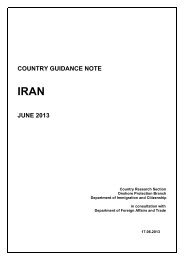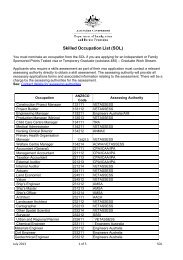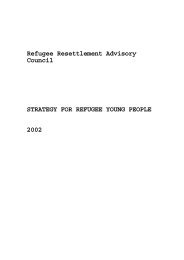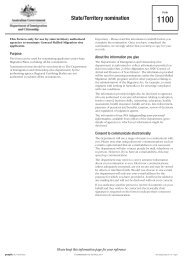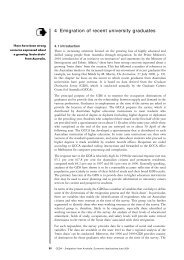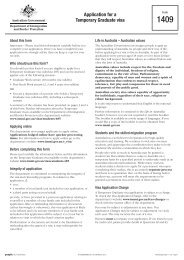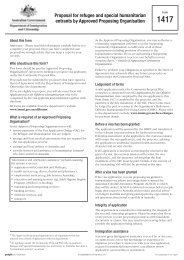Evaluation of the Integrated Humanitarian Settlement Strategy (IHSS)
Evaluation of the Integrated Humanitarian Settlement Strategy (IHSS)
Evaluation of the Integrated Humanitarian Settlement Strategy (IHSS)
You also want an ePaper? Increase the reach of your titles
YUMPU automatically turns print PDFs into web optimized ePapers that Google loves.
Consultations with volunteers suggested that <strong>the</strong> CSR service has been adversely affected through<br />
this delay. The evaluators met some would-be volunteers who had ‘signed on’ and undergone police<br />
checks many months earlier and had no contact with anyone regarding <strong>the</strong>ir roles as volunteers.<br />
Although <strong>the</strong>y were still interested in working as volunteers, <strong>the</strong>ir enthusiasm has been dampened by<br />
<strong>the</strong> lack <strong>of</strong> action.<br />
Some stakeholders and service providers were critical <strong>of</strong> <strong>the</strong> attachment <strong>of</strong> volunteers to <strong>the</strong> SSP<br />
service. In particular, <strong>the</strong> notion that a contractor external to any <strong>IHSS</strong> service deliverer could<br />
effectively recruit and train a body <strong>of</strong> volunteers was seen as being possibly unworkable.<br />
Fundamentally, <strong>the</strong>se stakeholders consider that volunteers are integral to <strong>the</strong> operation <strong>of</strong> specific<br />
services and community groups and should not be a separate body with limited roles to play.<br />
A fur<strong>the</strong>r problem is that <strong>the</strong>re continues to be a significant number <strong>of</strong> volunteers (generally <strong>the</strong><br />
previous CRSS volunteers) who have not yet and maybe never will come under <strong>the</strong> CSR service. As<br />
a consequence <strong>the</strong> SSP provider will only be able to coordinate a portion (and possibly only a<br />
minority) <strong>of</strong> active volunteers. Whe<strong>the</strong>r this will change once <strong>the</strong> SSP becomes fully operational is yet<br />
to be seen. SSP will however be able to <strong>of</strong>fer training to volunteers working directly with <strong>IHSS</strong> service<br />
providers.<br />
Training and information needs <strong>of</strong> <strong>IHSS</strong> service providers<br />
The o<strong>the</strong>r main area <strong>of</strong> responsibility <strong>of</strong> <strong>the</strong> SSP is to identify both training and information needs and<br />
<strong>the</strong>n to deliver training. In many localities this needs assessment had taken place, in some instances<br />
only shortly before <strong>the</strong> evaluation fieldwork.<br />
In carrying out <strong>the</strong> needs analysis, <strong>the</strong> SSP provider reported encountering <strong>the</strong> following:<br />
that <strong>IHSS</strong> service providers had not been adequately trained on <strong>the</strong> <strong>IHSS</strong> model or its<br />
implications<br />
that not all <strong>IHSS</strong> service providers were adequately skilled to manage purchaser-provider<br />
contractual services<br />
that service providers had very few opportunities to debrief and consult with DIMIA staff on<br />
difficulties experienced with service delivery<br />
that not all <strong>IHSS</strong> service providers are aware <strong>of</strong> all <strong>the</strong> relevant aspects <strong>of</strong> <strong>the</strong> <strong>IHSS</strong> program (eg<br />
overseas posts, o<strong>the</strong>r service providers and <strong>the</strong> role <strong>of</strong> volunteers).<br />
A number <strong>of</strong> <strong>IHSS</strong> service providers have found that <strong>the</strong> delay in implementing SSP has meant that<br />
<strong>the</strong>ir training needs are now different from those <strong>the</strong>y had earlier. Most <strong>IHSS</strong> service providers state<br />
that <strong>the</strong>ir training needs are now more pr<strong>of</strong>essionally based ra<strong>the</strong>r than service-related. The SSP<br />
provider reported that in completing <strong>the</strong> training needs analysis most service providers are looking for<br />
pr<strong>of</strong>essionally stimulating training ra<strong>the</strong>r than service-related courses. That is, <strong>the</strong> training sought is to<br />
assist with improving practice, standards and service delivery.<br />
The training needs [requiring attention <strong>of</strong> SSP] are not to skill unskilled staff. That<br />
responsibility lies with <strong>the</strong> service provider who employs those staff. [The issue is] more<br />
that <strong>IHSS</strong> contractors wish to have access to research papers, new models and methods<br />
<strong>of</strong> service delivery and opportunities to improve and enhance skills through peer group<br />
discussion and case analysis.<br />
(Service Provider)<br />
61<br />
<strong>Evaluation</strong> <strong>of</strong> <strong>the</strong> <strong>Integrated</strong> <strong>Humanitarian</strong> <strong>Settlement</strong> <strong>Strategy</strong> 27 May 2003



